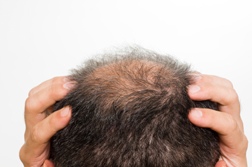 Just ask ''James,'' the UK man who was interviewed by the British Broadcasting Corporation (BBC) in 2010. After starting on finasteride and noticing that he was losing his urge for sex, James stopped taking Propecia.
Just ask ''James,'' the UK man who was interviewed by the British Broadcasting Corporation (BBC) in 2010. After starting on finasteride and noticing that he was losing his urge for sex, James stopped taking Propecia.But his sex drive did not come back. Testosterone therapy failed to have any impact on what had evolved to be complete impotence. A specialist eventually offered James a penile implant so he could resume having sex.
"[Propecia] did work well for my hair," the man said, in comments published April 8 in the National Business Review (NBR) of New Zealand. "But the cost is ridiculous—losing my sex life. Every day I wish I could turn back the clock" and put the Propecia side effects behind him.
James is just 26 years old.
The world was reminded during the recent Royal wedding of Prince William and Kate Middleton, just how young some men can begin suffering hair loss. Prince William's own hair loss is quite pronounced, and the media is awash in advice for the young Royal on how he might stem the tide. Treatment with Propecia finasteride has been oft suggested.
But the risks of prolonged Propecia sexual dysfunction long after Propecia has been stopped are very real, according to Dr. Irwin Goldstein, the editor-in-chief of the Journal of Sexual Medicine. Goldstein highlighted the 0.3 percent of men who reported problems with Propecia sex drive up to five years after stopping Propecia, as noted in Merck & Co's clinical trails.
READ MORE PROPECIA LEGAL NEWS
Now, a new study is at odds with Merck's own claims of less than 2 percent. According to the NBR, 4.2 percent of study participants taking Propecia finasteride and dutasteride (it was not reported if the drugs were taken separately or together) experienced erectile dysfunction, diminished libido and depression. That's more than twice Merck's findings in their clinical trials.
Referencing the Propecia side effects issue, University of Auckland School of Pharmacy professor John Shaw noted, "If it truly is a choice between baldness and impotence [as a 60-year-old male], I know which [option] I would choose."
